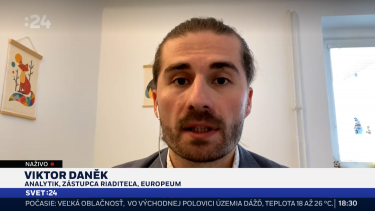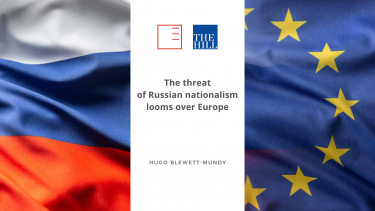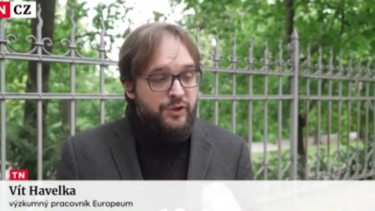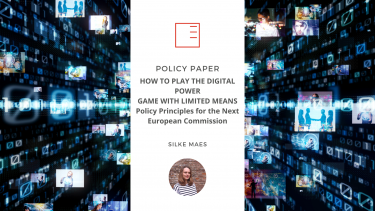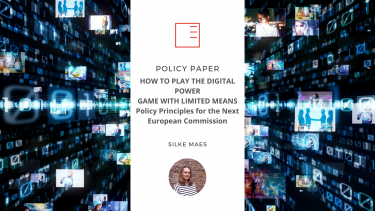RTVS | Does von der Leyen have a clear opponent after the Spitzenkandidaten debate?
Five candidates for the post of European Commission chief clashed in a Europe-wide debate on Thursday. Two factions did not field a candidate. The system of spitzenkandidaten, i.e. the leading candidates of each group for the post of president of the European executive, was created as an effort by MEPs to increase transparency in the filling of the highest posts in the European Union, which clearly includes the president of the Commission. Who will be the one who will form the majority after the elections and does the current head of the Commission, Ursula von der Leyen, have a significant opponent among the other spitzenkandidaten? Viktor Daněk, deputy director of EUROPEUM Institute, analysed the debate for RTVS.
Zjistit víceThe Hill | The threat of Russian nationalism looms over Europe
The threat of Russian nationalism poses a serious danger to Europe, as emphasized by the EU's High Representative for Foreign Affairs and Security Policy Josep Borrell in his speech in April. Russia is attempting to reassert its influence, particularly through its war against Ukraine, which undermines European security. What impact does the reemergence of Russian nationalism, supported by China, have on European security, and how should the West respond to this geopolitical reality? In his commentary for the American news website The Hill, Hugo Blewett-Mundy, an external collaborator and research fellow at EUROPEUM Institute, addresses this topic.
Zjistit víceTelevizní noviny | Do the EU elections have the potential to change the support of Ukraine?
There have been opinions that call for changes of the EU including defense cooperation or foreign policy. The topic that should stay important even after the EU elections is the support of Ukraine. Do the EU elections have the potential to change the intensity of the EU's support of Ukraine? Vít Havelka, a senior researcher at EUROPEUM Institute answered for the main evening broadcast of TV Nova.
Zjistit více
Policy Paper | HOW TO PLAY THE DIGITAL POWER GAME WITH LIMITED MEANS Policy Principles for the Next European Commission
In the global competition for technological dominance, this policy brief sets out six principles for the next Commission on how to play the digital power game with limited resources. Despite the size of its market, the EU lacks common fiscal capacity, capital markets and labour market dynamics. Writes Silke Maes, Research Fellow at EUROPEUM Institute.
Zjistit vícePolicy Paper | HOW TO PLAY THE DIGITAL POWER GAME WITH LIMITED MEANS Policy Principles for the Next European Commission
Svět se nachází v horké fázi globální soutěže o nadvládu v nových technologiích. Pokud chce EU zůstat do budoucna konkurenceschopná, musí být více aktivní. Jak na to rozebírá náš nejnovější policy paper z pera výzkumné pracovnice Silke Maes. Navrhuje v něm šest konkrétních kroků pro novou Evropskou komisi vzešlou z voleb do EP v roce 2024.
Zjistit víceDvacet minut Radiožurnálu | Summit in Brussels: Ukraine needs investment in offensive capabilities
At Brussels, on April 17th and 18th, an extraordinary summit of European Union took place. Originally it was intended to focus on enhancing the bloc's competitiveness, but the agenda of the meeting shifted towards discussing military support for Ukraine, and the situation in the Middle East. Viktor Daněk, deputy director of the Institute of European Policy EUROPEUM provided analysis on the topic for a daily episode of Dvacet minut Radiožurnálu.
Zjistit víceČT24 | Nuclear Forum and EU Summit in Brussels
Support for Ukraine, the situation in Gaza, agricultural policy and other - topics of this month's EU summit in Brussels. What will be the most pressing topics? What will the EU say about the situation in Gaza, will it adjust the demands on agriculture and negotiate the freezing of Russian funds? Vít Havelka, an analyst at EUROPEUM Institute, commented on the topics for ČT24.
Zjistit více
TN.cz | Meeting of the Visegrad Group Foreign Ministers
The current format of the Visegrad Group lacks common topics; the group fragmented into two pairs that have different opinions in many areas, particularly regarding the issue of Ukraine. However, the interests of Hungary and Slovakia are not in conflict with others, despite what their leaders claim. The conflict in the Middle East, where the Czech Republic is in the minority in its full support of Israel, was also discussed on this meeting. Viktor Daněk, deputy director of EUROPEUM Institute, commented on the situation within the V4 for TN Live.
Zjistit víceČRo Radiožurnál | Use of Russian assets under the European Peace Facility
The European Commission has proposed how to make use of frozen Russian assets in Europe after the start of the Russian invasion of Ukraine. Up to ninety percent of the assets would be used to buy weapons for Ukraine under the so-called European Peace Facility. The remaining 10% would be transferred to the EU budget and used for the recovery and reconstruction of Ukraine. The proposal still needs to be unanimously approved by EU foreign ministers. Martin Vokálek, Executive Director of EUROPEUM Institute, commented on what this proposal will mean for Ukraine and the European Union for Czech Radio Radiožurnál.
Zjistit více
RTVS | The European Union approves aid to Ukraine of 5 billion euros and creates a special fund
The countries of the European Union have approved aid in the form of an increase of the European Peace Facility (EPF) by five billion euros. The decision to create a special fund to help Ukraine represents an important step towards strengthening support for the country against Russian aggression. Žiga Faktor, deputy director of the EUROPEUM Institute and head of the Brussels office, commented on the creation of the fund and its possible results for Slovakian RTVS.
Zjistit více
Staroměstské náměstí 4/1
Praha 1 - Staré Město
110 00
tel.: +420 212 246 552
email: europeum@europeum.org
https://www.europeum.org
